FIDE’s African Problem

Last month, the world’s marquee team tournament known as the “Chess Olympiad” ended in Tromso, Norway with record attendance of 174 nations. This included a record 34 present from Africa (excluding eight proxies). While I am not certain when the first African federation joined the World Chess Federation (FIDE), nations from this continent have been participating in international competitions for decades.
In fact, the Africans are usually conspicuous with their colorful uniforms, official jackets and infectious spirit. Certainly, the spirit of chess flows through Africa’s veins and hearts. It is ironic that chess still struggles to find support on the massive continent despite producing many top-level draughts players.
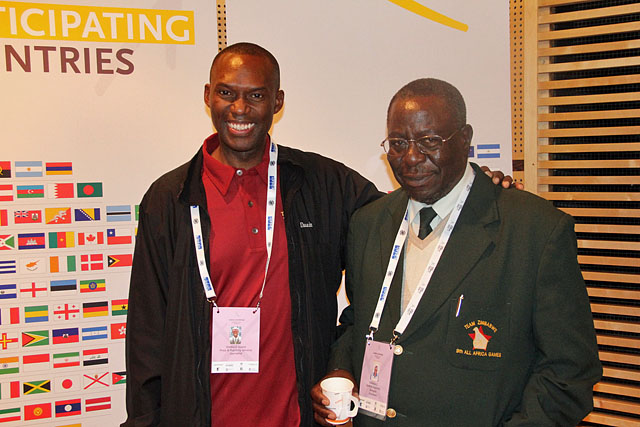
The Chess Drum’s Daaim Shabazz with Charles Kuwaza of Zimbabwe.
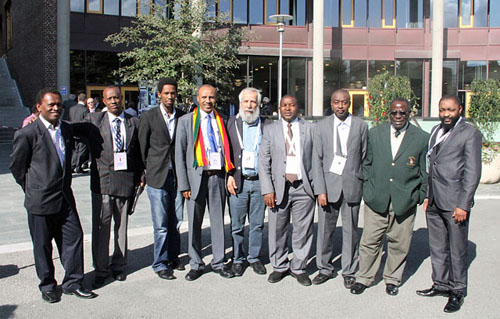
There are several reasons for Africa’s sluggish growth in chess and it may mirror many other problems existing within the socio-economic and geopolitical landscape of the continent. However, when looking at Africa’s standing in FIDE over the past decades, it is obvious that there needs to be more attention paid to the sustainable growth of 42 African federations.
.jpg)
Zienab Mustafa Mansour of the Sudan is a player of one of the
young chess nations in Africa seeking growth.
Photo by chess24.com
In my years of covering chess, there appears to be a myriad of problems pertaining to chess growth on the large continent. First, is the massive size of the continent which makes it very impractical to travel such long distances. This problem also appears in other regions with developing chess communities. Second, economics appears to be the major obstacle to chess development in Africa with federations struggling to draw sponsorship, host regular activities and run a functioning administrative location. Thirdly, Africa suffers due to the lack of connection between the chess community and larger constituencies.
While these shortcomings are due to a number of reasons, FIDE’s treatment of Africa has not been progressive. In this past election campaign, there were many controversies surrounding the continent including, but not limited to the issue of delegates. Expectantly, there was an effort by both election campaigns to pool the voting delegates of Africa into a winning formula.
.jpg)
Should Ghana have the same voting power as Russia or the USA?
Both campaign parties believed so.
The image that had been cast is that in Africa all you need is a suitcase full of incentives to sway votes. Of course, this is a gross exaggeration. In the past, there was even a notion that African nations were unworthy of a singular vote and that more powerful nations should wield heavier influence. However, this was disavowed by both campaigns. In the General Assembly, there is the one-nation, one-vote system giving the smallest federation the same voting power as the largest. Thus stakes were very high.
As the campaign drew nearer, there were controversies including several federations whose voting delegates had been removed altogether and changed. This essay is not to delve into these controversies, rehash the details and determine which campaign was justified in their attacks. These are now public records. However, there must NOT be a rerun of this episode in 2018 since the last election turned into a “Scramble for Africa“. This is the last thing the continent needs.
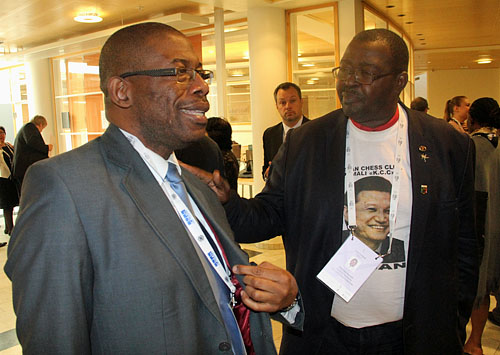
“Kasparov2014” supporter Barthelemy Bongo of Gabon speaking amicably with “FIDE First” supporter, Konate Ibrahima of Mali. Bongo spoke to The Chess Drum about Gabon’s situation.15:22 minutes
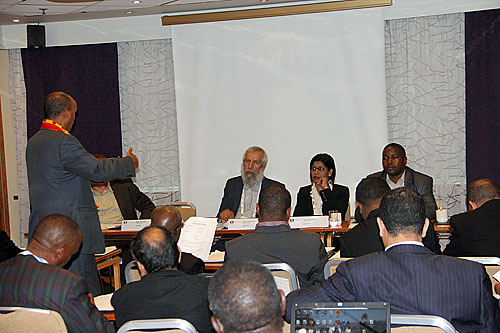
This election divided the continent… divided regions… and divided federations. To witness the chaos of the African Assembly was sad regardless of whose side one supported. It was an unmitigated disaster. I attended the morning half of the African Congress before going to the playing hall to cover the beginning of the eighth round. I then got a report that the Congress had descended into chaos with the presiding chair walking out of the room. The body appointed an interim chair and continued the meeting.
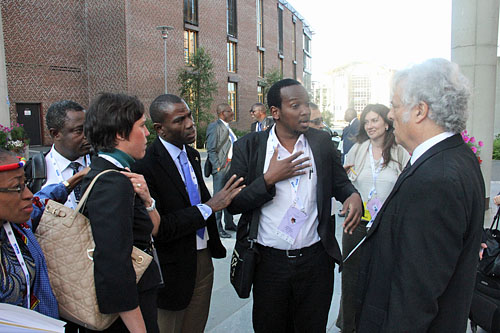
On the next day, there was a chance to reconcile the issue. Unfortunately, when I arrived there were two meetings and two separate votes. There was FIDE officers buzzing about and I saw Garry Kasparov rushing down the hall. I was later told that when members of both parties arrived, a dispute ensued and the meeting split into two separate groups. When I tried to enter the meeting led by Mazouz, he informed me “no journalists” were allowed. I immediately left the room.
There had been the suspicion that chess journalists were supporting Kasparov. Perhaps this suspicion goes back to the FIDE clashes with journalists in Istanbul and several endorsements given to Kasparov by influential chess websites. Later I was allowed in and talked with Lewis Ncube about the rift. He cited the interference of lawyers and the issue of the delegate count. Unfortunately, I did not record the conversation or take any photographs for fear of jeopardizing my access.
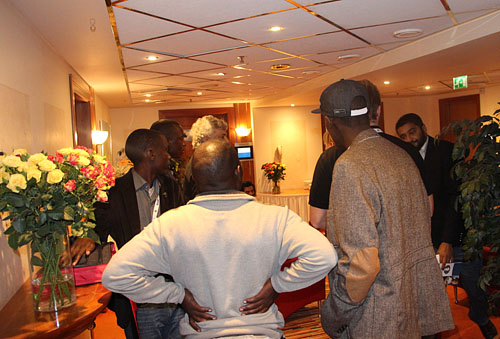
FIDE’s Israel Gelfer with African players and delegates outside meeting room
after two factions formed.
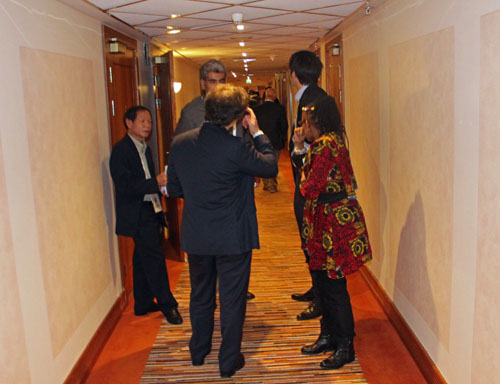
The Kasparov team can be seen down the hall strategizing.
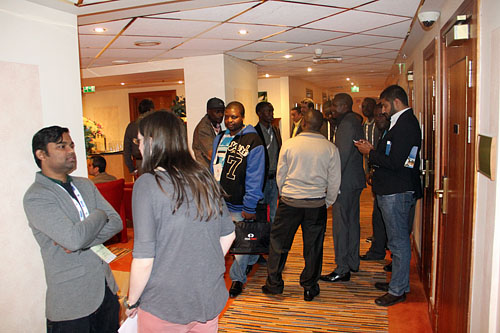
There were hushed tones throughout the corridor,
but inside the room the scenes were more tense.
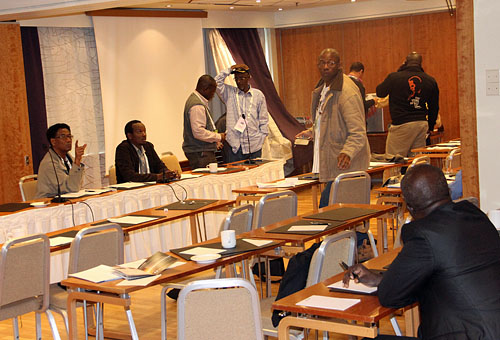
The pro-Kasparov faction continue the meeting and proceed to hold elections.
I went to the other room and talked for 30 minutes with both Leykun Adeyemi (Nigeria) and Githinji Hinga (Kenya) who cited justification based on the statutes of the African Chess Confederation (ACC)… listen. As a member of the Pan-African Diaspora, I was extremely saddened. After learning what had transpired, it was a truly pitiful occurrence as African delegates were in the corridors speaking amongst themselves with distrust in their hearts. A wedge had been driven between them by outsiders.
These tensions brewing prior to the Olympiad sessions led to contentious encounters. Georgios Makropolous came tête-à-tête with Dr. Essoh Essis in the General Assembly and refused to yield the floor to the Ivorian delegate. Makropolous charged Essoh with disrupting the disputed African Congress and accused him of repeating earlier points. This confrontation continued outside during a coffee break.
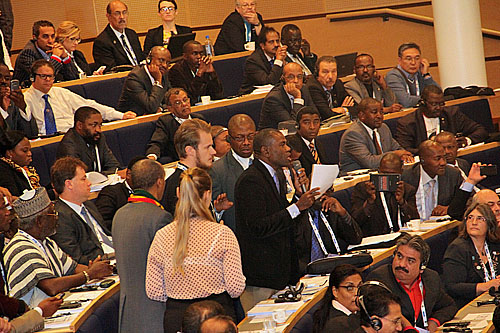
A showdown occurred between Dr. Essoh Essis of Cote d’Ivoire and…

…Georgios Makropolous seen gesturing.
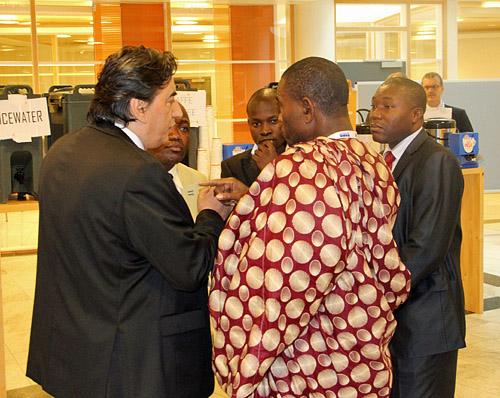
Of course, this is not the way to have a civil discussion even if two sides does not agree. It is the first time in recent years that Africa has been thrust in FIDE’s political spotlight so prominently. Perhaps this election will show that African nations will be resolute in their views even if it means voting for different candidates. However, it has to be done in a manner that maintains the integrity and dignity of Africa.
Issues in the past such as expulsion due to arrears, repeated visa imbroglios, sponsorship shortages for travel and unfair adjudication of “zero tolerance” policies (which disproportionately affected African countries who lived as much as one hour away from the venue). The 2008 Olympiad in Dresden was a disastrous laboratory experiment for the zero tolerance rule. One nation was forfeited despite the tram breaking down. When this was confirmed the forfeit was still upheld.
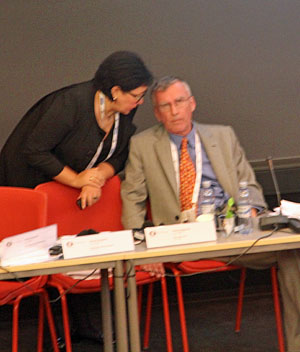
FIDE Treasurer/Executive Director Nigel Freeman created quite a stir
on the 2018 Olympiad bidding.
Finally, there was the misstep by Nigel Freeman when he possibly influenced the voting for the Olympiad bidding for 2018. After giving a report on the result of his inspection, he stated affirmatively that while both Georgia and South Africa were capable holding a successful Olympiad tournament, Georgia “was the superior choice.” This created a buzz of condemnation since the delegates had not voted yet and his comments may have swayed the vote.
The South Africans objected and there was support by Ignatius Leong and Ian Wilkinson for South Africa and Geoffrey Borg for Georgia, but the issue became a partisan one. Those supporting Kirsan Ilymzhinov mainly voted for Georgia and those voting for Kasparov mainly voted for South Africa. It would have been best that no endorsements were given by people on either ticket to avoid this type of dynamic.
Some African nations were encouraged to vote against having the Olympiad in South Africa because of their campaign allegiance. During the break, Freeman could be heard explaining to Jamaica’s Wilkinson that South Africa simply was not ready. Georgia won the vote and jubilant roars could be heard from outside the hall.
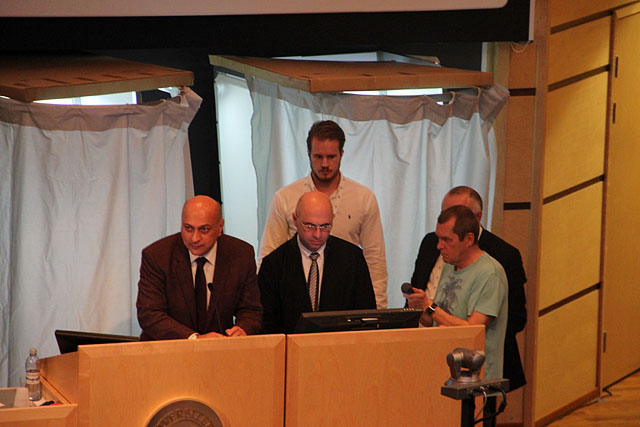
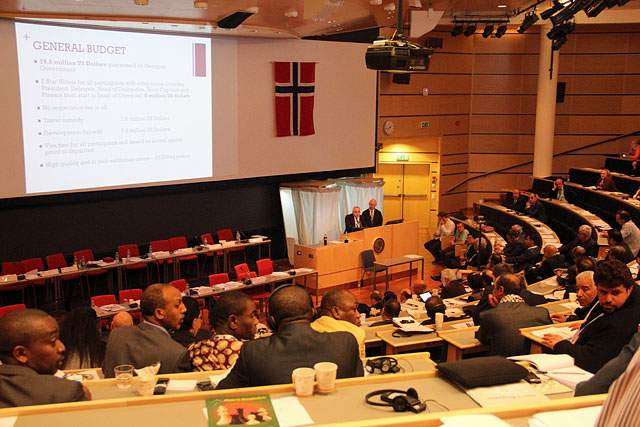
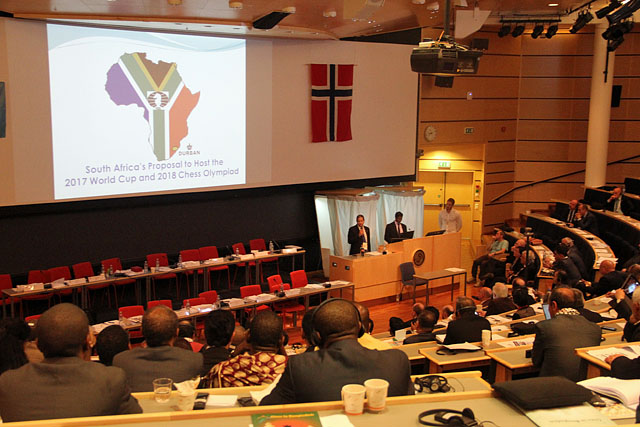
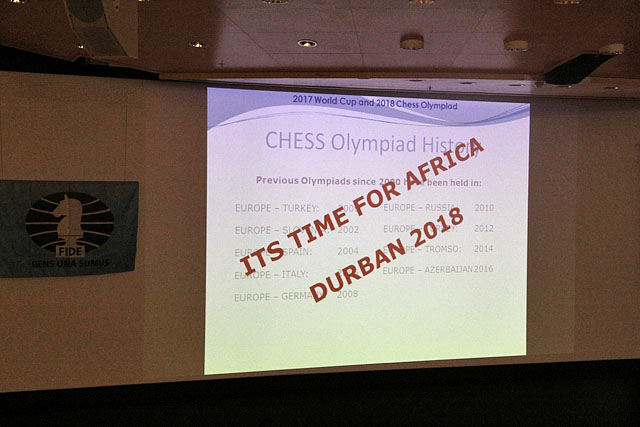
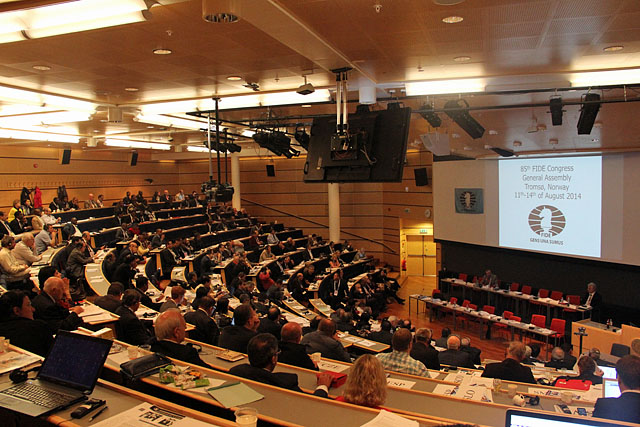
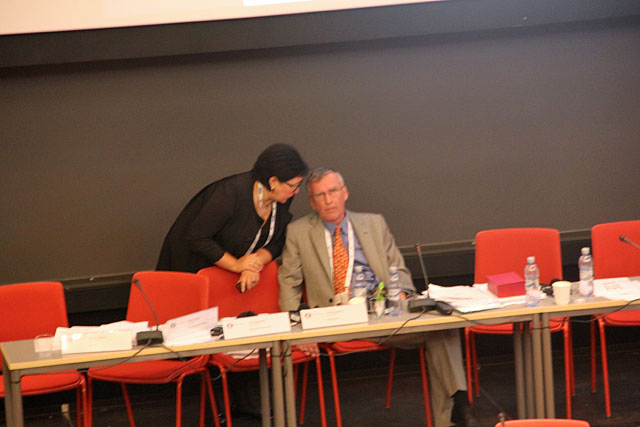
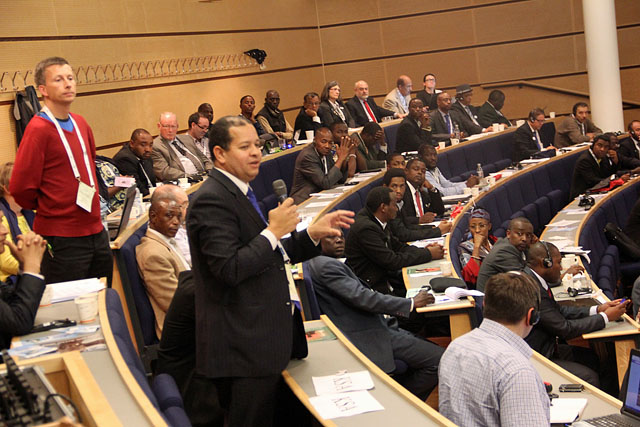
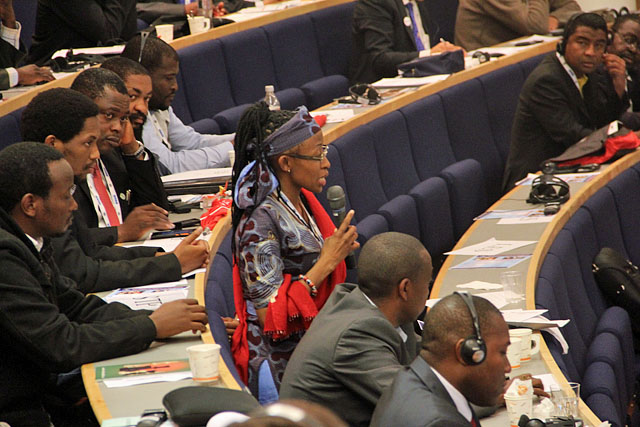
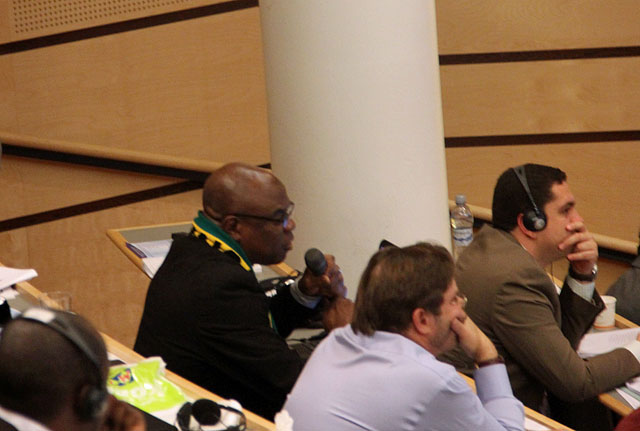
* * *
Images from the FIDE Congress… bidding of 2018 Olympiad.
CLICK to see larger images. Hover to get descriptions.
Every Olympiad since 1992 has been held in the European region and only six times in other regions (if you count Libya/Israel 1976). In fact, the next two Olympiad will be held in neighboring nations (Baku, Azerbaijan 2016 and Batumi, Georgia 2018). It would have been a wonderful opportunity for the growth of chess in Africa. It is difficult for chess to grow in Africa (or globally) with a decidedly Eurocentric outlook. It was shameful to see that an Olympiad bid would become politically-charged along election party lines.
In the final analysis, Africa is accountable for their own destiny. This is true as a continent and it is true in chess. There are ways to make use of resources due to the diffusion of technology. Most players have access to useful internet sites with free content and game servers. In actuality, the talent is bubbling within Africa, but seems to halt at critical points. Players like International Masters Stanley Chumfwa (Zambia) and Robert Gwaze (Zimbabwe) no doubt have possessed GM-level talent, but how does one harness this talent? Ilymumzhinov announced an African Commission (with GM Nigel Short as the Director) to further chess development in Africa. Now that he has won the election, we will have to see whether this will come into fruition.
However, FIDE cannot wait until election time to pledge assistance along with Chess-in-Schools and other promises made. That is also true for those with alternative visions. Where is the accounting of African progress between 2010-2014? With a new continental President in Lewis Ncube, these will be questions going forth.
Ncube has cited a inventive fundraising program, but until these plans come into fruition, the question raised about African neglect will persist and this conversation will resurface. Nevertheless, African cannot allow what occurred in Tromso, Norway to happen again. While the Tromso Olympiad may have been damaging for African unity, it did a great deal in helping FIDE to face the reality of its everpresent “African Problem”.
All photos by Daaim Shabazz (The Chess Drum) unless otherwise stated.

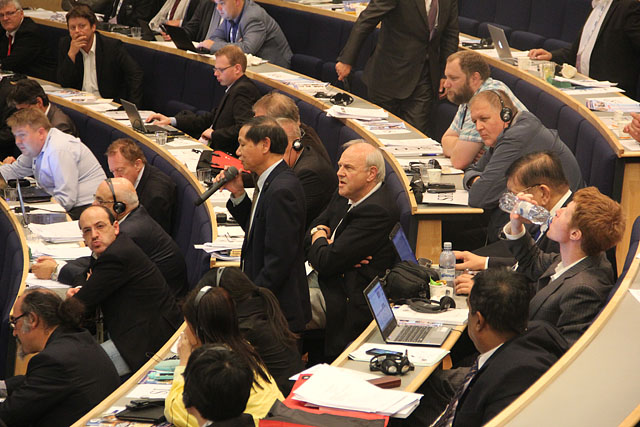
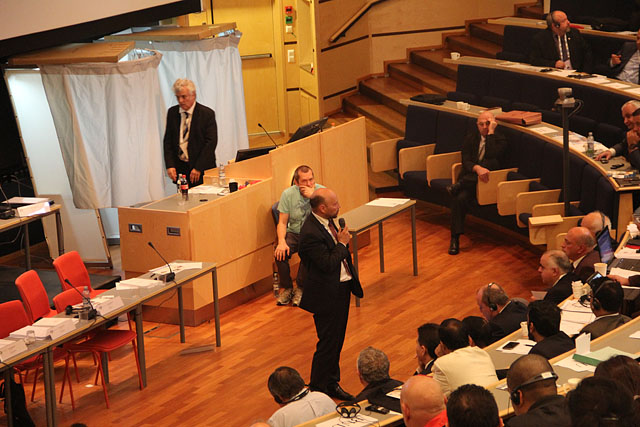
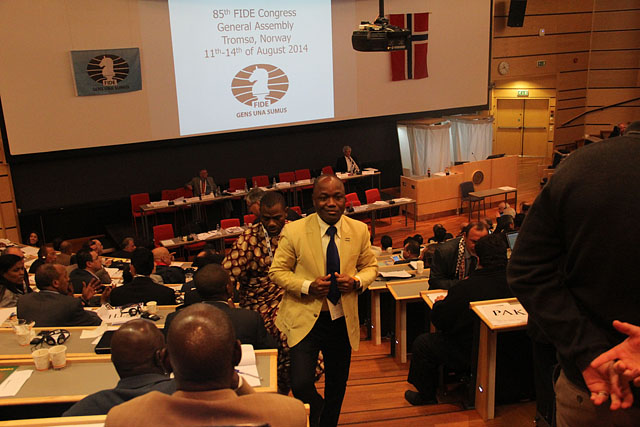
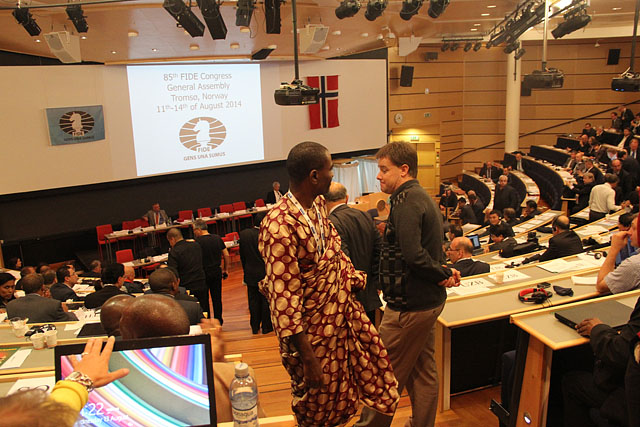
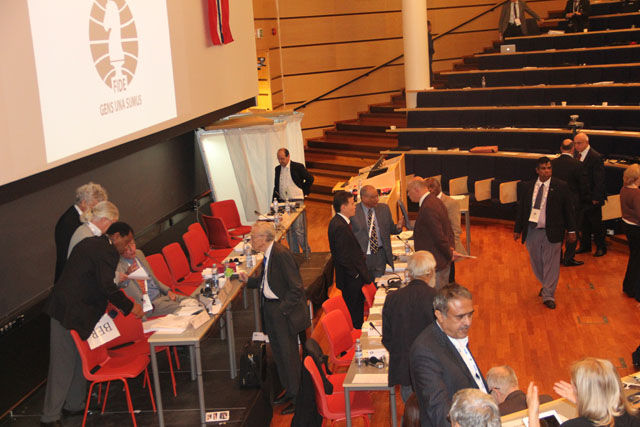
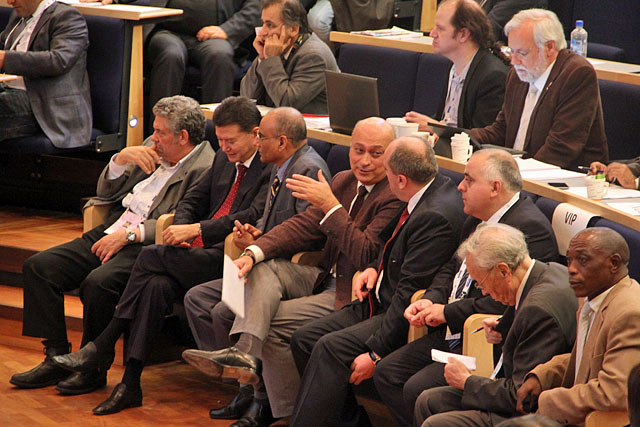
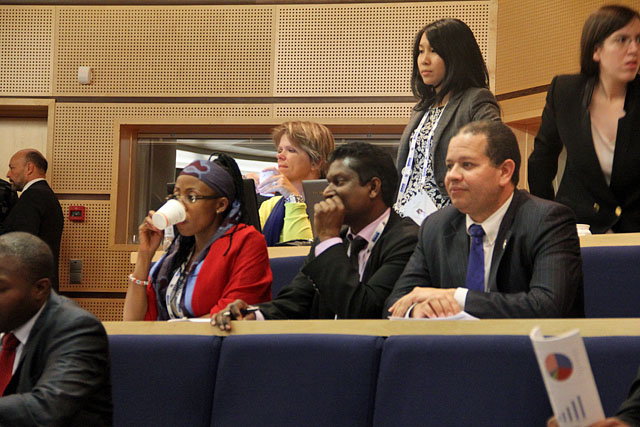
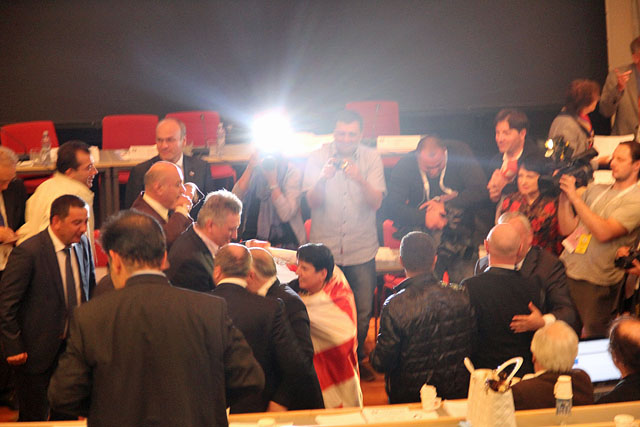
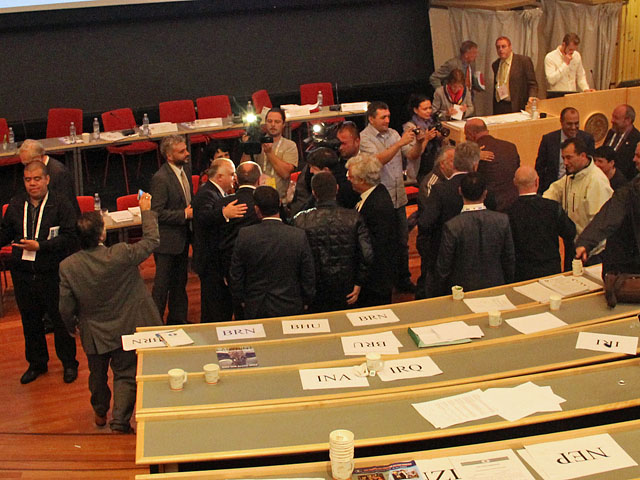
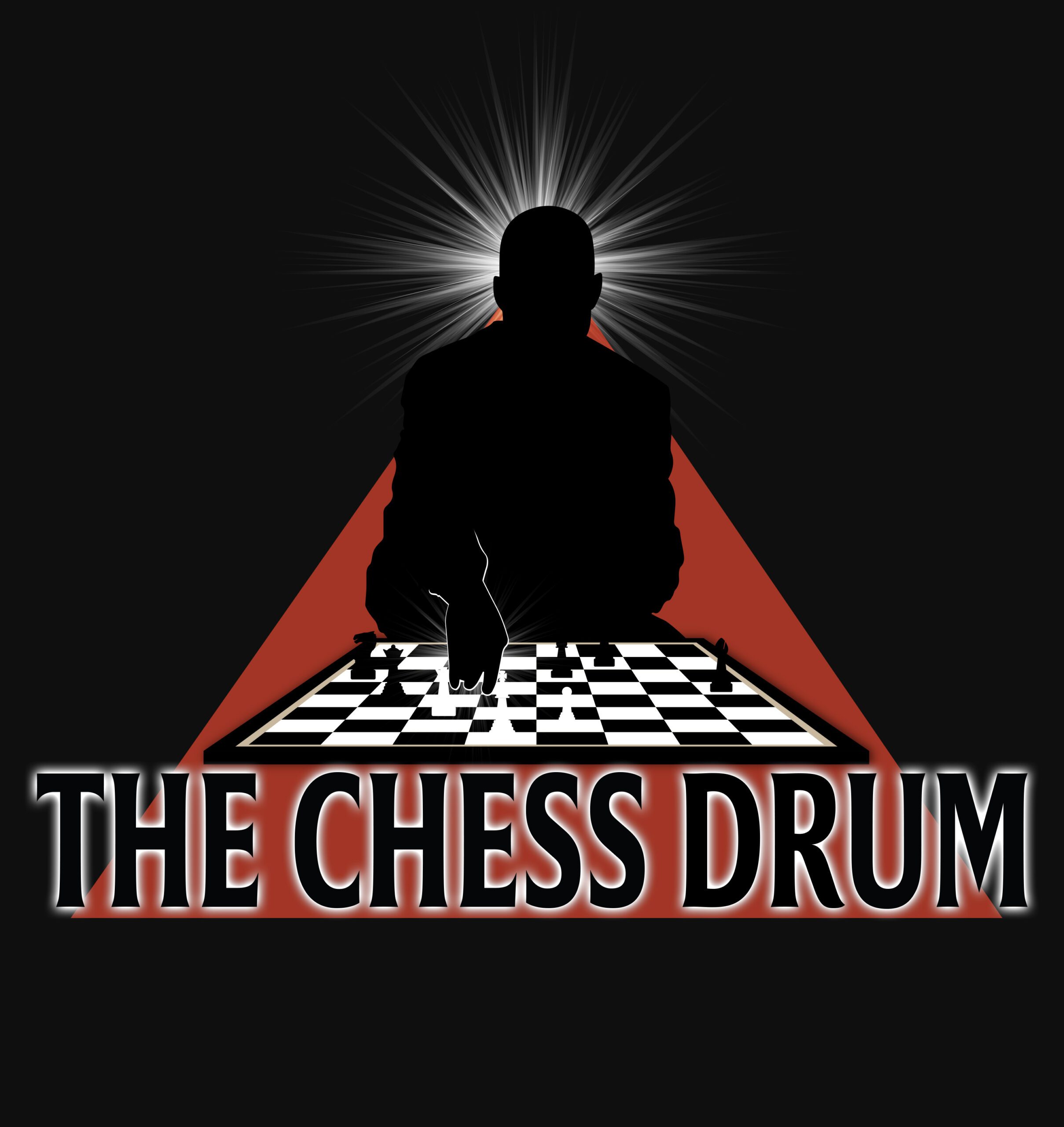
Daaim,
As usual many thanks for reporting while deep inside FIDE.
Great stuff.
Kind regards
Kim
Kim,
I don’t believe chess politicians realize the damage they cause to Africa when they engage in these power politics. There was far too much interference in Africa’s business… even by well-meaning people. That much was apparent.
FIDE seems to go through this every four years. There has to be more accountability or Africa will continue to be marginalized as a chess region.
Daaim,
Thank you for the piece. I will not comment now save to say that one of the personal benefits for me from the Tromso experience was that I got to meet, and fraternize with, a lot of my African brothers and sisters in the chess world, regardless of their political affiliation. More anon!
It was notable that after the Tromso Olympiad and the FIDE election a member of the Kasparov team described Africa as “the only honourable continent. If they said they would vote for you, they did. If they said they wouldn’t, they didn’t. I couldn’t say that about any other continent, including Europe.”
Great analysis Daaim!!!!I totally agree!!
Unfortunately, I don’t believe the winning campaign will make much difference in Africa the next four years. Nothing happened in 2010-2014. In fact, Africa regressed. It appear that Ilyumzhinov’s rash of trips to Africa came as a result of campaigning. Africa is on her own.
Daaim, I’m interested in your above statement in the article as follows:
“Certainly, the spirit of chess flows through Africa’s veins and hearts. It is ironic that chess still struggles to find support on the massive continent despite producing many top-level draughts players. ”
As I understand it, there was an article of yours discussing at least one past African World Checkers Champion. I’m curious about a couple of things, 1) did draughts/checkers have the kind of support in Africa that we are looking for in chess? 2) if so, was such support necessary in producing top level checkers players? 3) if so, does checkers still have that kind of support? 4) or is checkers a different animal in too many ways to make these comparisons?
wHOS the Highest rated person of African descent in chess history? secondly are their any over the 2700 barrier currently? IF not why not? its an Ultramodern query ive had a while and lookin forward to an answer.
Lionel, I’ll put my 2 cents in..
I would say Maurice Ashley. He was at 2600 back before all the ratings inflation that we’ve recently seen. Before ratings inflation, 2600 was in the neighborhood of a contender. Nigel Short was in the 2600’s when he challenged Kasparov.
As far as 2700 is concerned, very few nations in the world have produced one. Japan hasn’t even produced a single GM while Zambia has! You can’t compare Japan to an entire continent, but one thing Japan has going for her is an ultramodern infrastructure 🙂
well patzer , thanks for ur 2 cents perhaps ill put it with mine and make FOUR!!! actually the traditional gms on ICC tried that same idea with me from 1998 to 2008 when i used my ultrapirc and tricky knight idea Na6-c7-e6, but somehow they dont seem to be laughin anymore, UM doin all the laughin now, Right Susan? LOL i wasnt askin about shorty, Japan or other nations, u KNOW that but u seem to want to distract. wHY?
If you’re talking about FIDE-rated it would be Pontus Carlsson who got as high as 2531, now 2492. Maurice has gotten to 2504 FIDE and over 2600 USCF. Rating is now 2440. USCF ratings are 100 inflated over FIDE ratings since the pool of players is not as deep or competitive.
2700 FIDE is a tough nut to crack. Unless you’re a professional, there is no chance and most Blacks do not have the resources or time to commit full-time to chess. It is a hard living for all but the top ten.
There are many who have not produced a GM and some nations like Zambia, Costa Rica and Venezuela have. Economic measure may not have as much to do with producing GMs than the overall culture and history of gaming. South Korea produced one GM without much of a chess culture despite the strong economy.
Oh, very informative, so Carlsson did push the envelope! hahaha, well good to know , 2700 fide looks like an interesting challenge, i hear everybody improving around the world so UM just curious about the practicers of African descent and how well we doin in the traditional events.Thanks!!!
I have written many essays on this issue. Check these…
https://www.thechessdrum.net/65thSquare/index.html
Wow, Great work , fascinating actually, ya know i wonder what the children many years from now will think of all this!!! hahahaa. thanks brother Shabazz ur good.
Thanks.
Hmm…Ashley’s highest FIDE rating in the chessgames.com database is 2579. And they only go by FIDE ratings.
Not possible. If you look at his FIDE card it is 2504. Chessgames.com is not to be trusted. Ashley has barely been over 2500 at anytime in his career mostly concentrating on other pursuits. His USCF high is 2606 I believe.
Understood. In chessgames defence, I would note that his fide card doesn’t go back further than 2000. He was Gm in 99. Chessgames has games going back to 1988.
Right… it’s an error. It could have been any number of reasons such as a transposition with another player. All you need is one data entry error to raise questions about the highest rating in the database. I’m looking at all of his games in the ChessBase online database and in at the end of 1997 his FIDE was 2445; at the end of 1998, he was 2490; at the end of 1999, he was 2473; at the end of 2000, he was 2499; at the end of 2001, he was 2484. In 2001, he made his career high rating. However, he had eclipsed the 2500 barrier in 1999 for a short time and went back under.
We witnessed a split at the meeting for Africa – almost equally divided. This may not be a bad thing. It means no one should be taken for granted as they had been treated that way for a very long time. Africa will learn from this and will be more maturely prepared some years later. Chess is not only for one continent. Africa may not be one voice – but this may not be a bad thing.
You’re right Ignatius. It is good to have a difference of view and an independence in voting. There can be disagreement, yet a civil exchange and maintenance of relationships. However, the mean-spirited exchange caused a division in an already fragile chess environment on the Africa. Division of federations and division between regional neighbors is not positive. Africa is a geographically large continent and small federations need cooperation to pool resources to hold successful events.